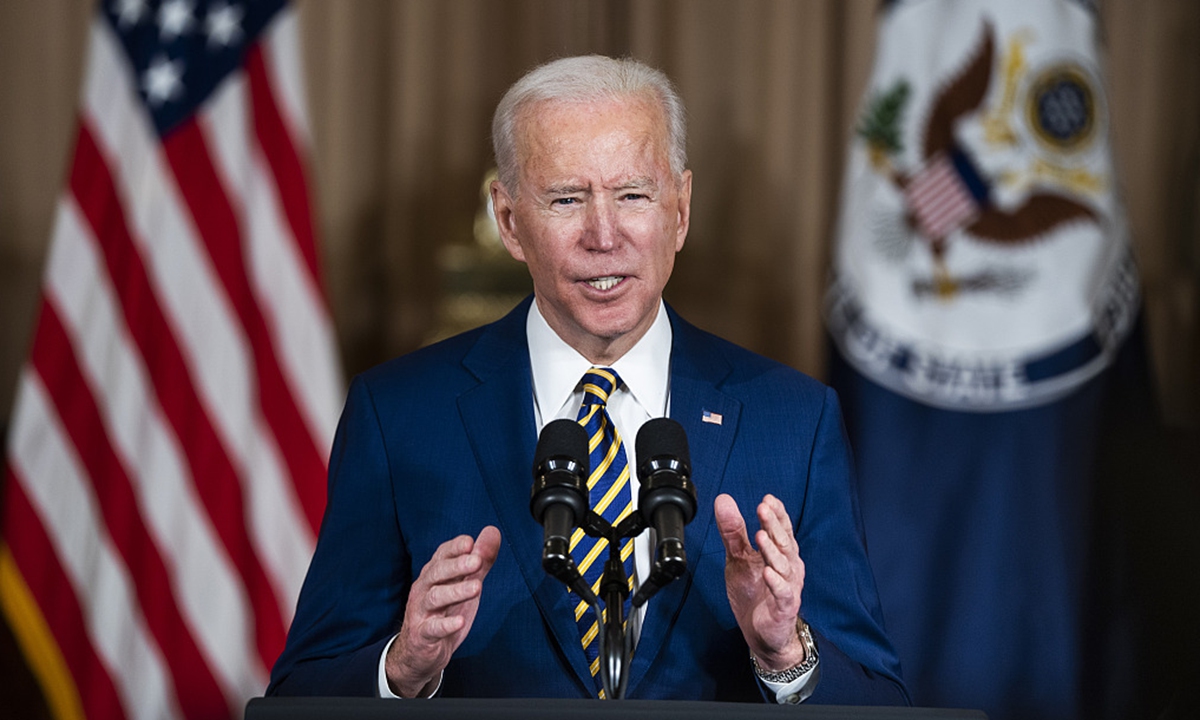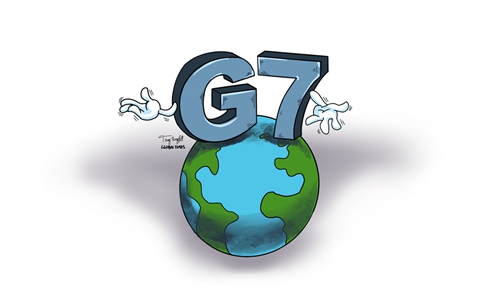Biden’s attempt to align with other G7 countries against China an ‘old tactic, won’t help recover US’ past glory’

US President Joe Biden. Photo: VCG
The world is closely watching whether US President Joe Biden will successfully unite its alliances in Europe in his first event with leaders from the Group of Seven nations (G7) in a virtual meeting on Friday to deal with the "China challenge."
Chinese observers predicted that Biden's attempt to ring-fence China with alliances, different from former president Donald Trump's tactic of "fighting alone," is like "putting old wine in new bottles." It will not prevail easily as the G7's perceptions about China are divided and the US cannot fulfill what they need and want.
They noted that choosing the G7 meeting as his first debut in a multilateral occasion as a president instead of other events like Davos attended by more new economies shows the US is still relying on its small clique, which will not help the country recover its past glories.
Biden, who took over from Trump on January 20, has conveyed a message of re-engagement with the world and global institutions by bringing the US back into the WHO and rejoining the Paris accord.
The White House said in Friday's meeting, Biden would focus his remarks on a global response to COVID-19 vaccine production and distribution as well as the importance of updating global rules to tackle economic challenges such as those posed by China.
"The choreographed appearance in the G7 meeting reflects the essence of the Democratic Party: soft on the outside while hard on the inside. That is to say, when it talks about tackling challenges posed by China, it actually means besieging China," Chen Fengying, a research fellow at the China Institutes of Contemporary International Relations, told the Global Times on Thursday.
The alliance will not go back to the old days with more solid common grounds. It is more like an ideological alliance - as the North Atlantic Treaty Organization (NATO) which has been focusing more on Russia instead of China, Chen said.
Chen pointed out that the group will likely continue to draw their lines on "values" such as human rights and affairs related to China's Xinjiang Uygur Autonomous Region and Hong Kong, but will unlikely change their position on economic and currency cooperation with China.
Chen warned that China should remain on high alert regarding the US' attempt to build a "little NATO" from the Atlantic to the Pacific Ocean, potentially drawing Japan and India to pressure China in military and advanced technologies.
Wang Yiwei, director of the Institute of International Affairs at Renmin University of China in Beijing, said what Biden wants to do at the G7 meeting is like putting "new wine into an old bottle," but it will not succeed as the attitude of other G7 countries and their policies toward China differ.
"Not all of them see China as the 'enemy' such as France and Germany. Even Japan, one of the US' most important allies in Asia may not view China as an 'enemy.' Under such circumstances, few of them would choose a side and a new 'cold war' is not in line with their interests," Wang told the Global Times on Thursday.
More importantly, what benefits would Biden bring to the alliances? Wang asked, noting that the US cannot help Europe gain strategic independence or digital sovereignty like the bloc has longed for, neither can it help Japan solve its new energy problem.
Such an "alliance" will not last long, he said.
"The alliance could be seen more as a coalition to defend the order and rules predominated by the Western, especially data rules, rather than an anti-China coalition," Wang said. "They have consensus on some issues related to China, but in practice, they would not fully obey US propositions."
China has voiced opposition to "exclusive cliques," saying "we oppose group politics based on ideological divides, forming exclusive cliques, and imposing the will of a minority group of countries over the international community," China's Foreign Ministry said in a statement on Tuesday sent to the South China Morning Post.
"Behaviors like these will not gain popularity among the international community, nor will they benefit the countries themselves, and will only further push the world towards division and even confrontation," the statement said.
The foreign ministry added that all international meetings should be conducive to multilateralism, and global affairs should be collectively managed by different nations.



